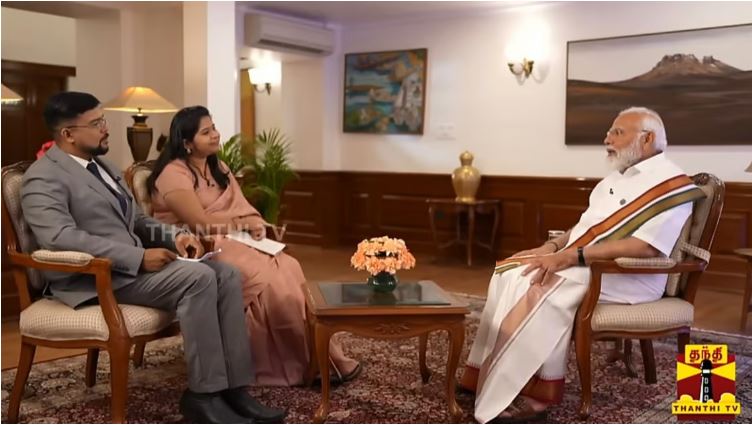
Those celebrating over SC rule on electoral bond will repent: PM Modi
text_fieldsIn a recent interview with Thanthi TV, Prime Minister Narendra Modi said that it would be those who are celebrating the Supreme Court's order to reveal the details of the electoral bonds scheme who would ultimately repent. PM Modi was responding to how the Supreme Court order impacted the BJP.
PM Modi's statement may be seen as a response to the recent notices issued by the Income Tax department to the Congress, demanding a substantial fine for alleged tax evasion.
When asked about the impact of the scheme's invalidation on the ruling BJP, the Prime Minister asserted that it had not caused a setback. He emphasized that the existence of electoral bonds enabled a trail of funds, allowing transparency in political funding—a facet absent before 2014. Modi defended the scheme, stating imperfections could be addressed, and those celebrating its demise would soon regret their stance.
Addressing concerns regarding the alleged misuse of the Enforcement Directorate (ED) against opposition parties, Prime Minister Narendra Modi emphasized the autonomy of central agencies. He stated that these agencies operate independently, free from interference or direction.
The Prime Minister highlighted the significant caseload of the ED, with less than 3% involving politicians. Drawing a comparison with the previous Congress government, Modi underscored the disparity in the amount of money seized under their tenure compared to his administration's efforts.
Additionally, he criticized the previous government for purportedly underutilizing the Prevention of Money Laundering Act (PMLA), suggesting that they exploited the judiciary to evade scrutiny, implying a lack of commitment to combat corruption.
The Supreme Court's ruling on February 15th declared electoral bonds as potentially fostering quid pro quo arrangements and thus unconstitutional. The scheme, introduced by the BJP-led Union government in 2018, permitted individuals to purchase bonds anonymously from the State Bank of India and donate them to political parties, circumventing the need for disclosure to the Election Commission.
Following the court's decision, the State Bank of India was directed to disclose details of political parties receiving electoral bonds from April 12, 2019. Initially, the bank withheld crucial information such as unique alphanumeric and serial numbers of the bonds. However, upon petitioners' insistence, this data was eventually revealed, shedding light on the predominant flow of donations to the BJP.
Analysis of the disclosed data highlighted a significant portion of electoral bond purchasers as companies previously subjected to central agency raids, raising questions about the nexus between political funding and corporate interests.
Prime Minister Modi's remarks come amidst growing scrutiny over the transparency and integrity of political funding mechanisms. While he defended the electoral bonds as a step towards financial accountability, critics argue that the anonymity they provided facilitated potential corruption and undermined democratic principles.






















